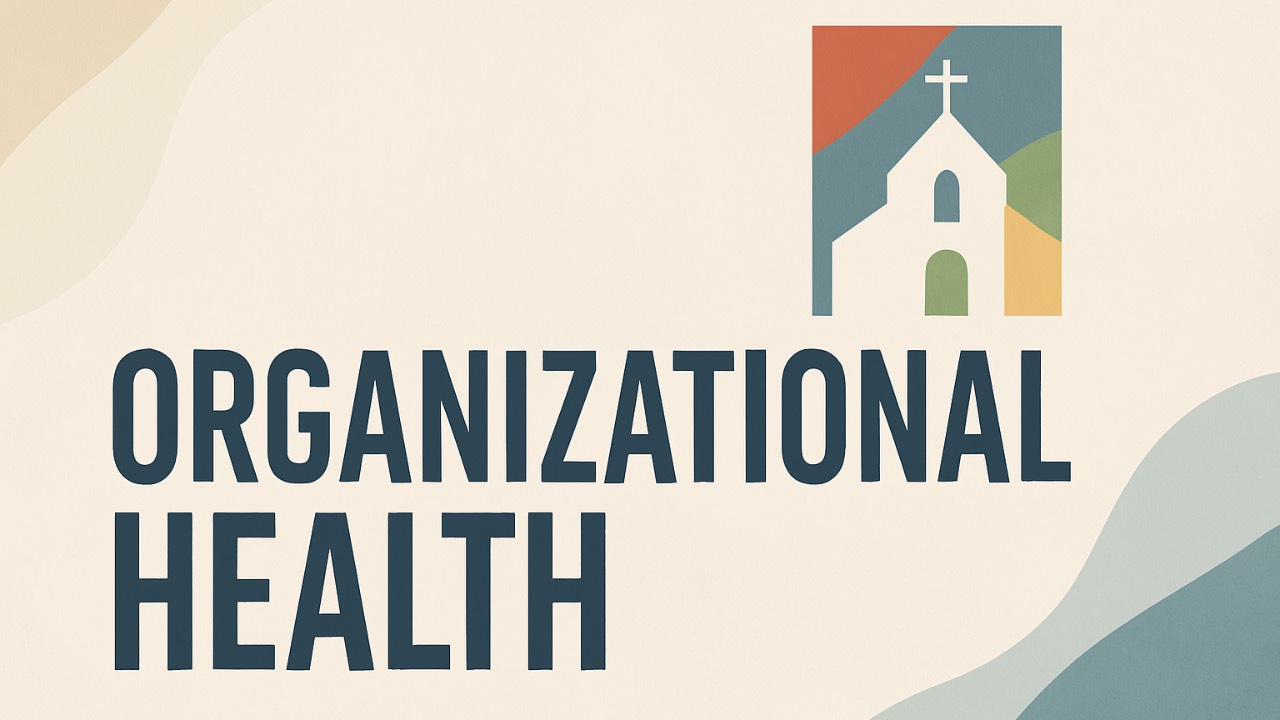Organizational Health

Course Description
Success in ministry is not achieved only by gifts and talents of the individual. Because no man is an island, individuals must collaborate to create an organizational structure. Learn how four key elements of an organization will determine the success of the ministry. These elements of mission, vision, values, and culture will be covered in detail in this course.
The course consists of 8 sessions, each session including a video and corresponding course notes. After each session the student will complete a 15 question quiz. Each quiz must be completed before moving onto the next session.
Recommended Reading
Organizational Health (Course Book), Michael McAfee
Session Overview
Session 1 - Introduction to Organizational Health: Foundation for Church and Ministry
In this first session of an eight-part series on Organizational Health the instructor introduces key concepts for structuring a healthy church or ministry. Drawing from the biblical creation account (Gen. 1–2 KJV), she outlines how vision, mission, strategy, values, and culture interrelate to eliminate chaos and produce life. Students will learn the difference between organization and bureaucracy, the two dimensions of a smart and healthy organization, and four disciplines for sustaining organizational health.
Session 2 - Vision—The Why
In Lesson 2, “Vision: The Why,” we unpack the pivotal role of vision in organizational health. Using the wheel‐and‐spokes analogy, she demonstrates how vision holds every ministry activity together and why every program, goal, and strategy must stem from it. Drawing on biblical examples—from Moses and the Exodus to New Testament teachings—students explore vision as God‐given prophetic destination, faith in action, and distinct from mere ideas. The session concludes with practical guidance on asking “Why?” and “How?” to eliminate chaos, foster discipline, and align church and community outreach with God’s overarching purpose.
Session 3 - Vision Implementation in Ministry
In this session, we examine how to move from God-given vision to concrete action within a church or ministry context. Drawing on Habakkuk 2:2–3 (KJV), the lecture emphasizes the necessity of writing and expounding the vision, distinguishing between a concise vision statement and its full articulation, and understanding the unique, God-revealed calling of each congregation. We also explore common secular sources of vision, reasons why vision may fail, and practical steps for communicating and activating a clear, compelling vision in one’s community.
Session 4 - Values
This lecture examines the central role of values in church organizational health. Students will learn to distinguish values from vision, explore types of values (core, aspirational, permission‐to‐play, accidental), and assess how values drive behavior, culture, and strategic priorities. Emphasis is placed on embedding values biblically—drawing on Matthew 20:26-28 and Matthew 6:33—and equipping leaders to communicate and live out these principles for a mission-focused, value-led ministry.
Session 5 - Vision, Communication, and Adaptive Leadership in the Church
In this session we explore the essentials of biblical leadership for pastors and ministry leaders. We begin by distinguishing between managers and leaders, then unpack a process‐oriented definition of leadership in three stages: crafting vision, influencing followers, and realizing goals. We examine core leadership functions—direction, reality‐checking, protection, and health—and identify five practices winning leaders use to shape organizational values. We emphasize that “leadership is communication,” discuss strategic messaging and active listening (with reference to John 5:1-9 and James 5:16), survey types of leadership power, and introduce adaptive leadership principles for navigating technical and people challenges.
Session 6 - Organizational Culture
In this session, we explore the nature of organizational culture in a church context: its automatic existence, its difference from climate, and its impact on members. We examine how leaders shape culture, tools for guided change (feedback, storytelling, recognition), the formation of healthy teams (Exodus 18), volunteer engagement, and the pursuit of short-term wins. Practical steps for recruiting and empowering new leaders conclude the study, equipping students to foster a kingdom-focused culture rather than a purely culture-driven ministry.
Session 7 - Mission, Strategy, and Organizational Health
In this session we distinguish vision from mission, examine why strategy is the bridge between idea and implementation, and explore practical tools for healthy organizational growth. Drawing on Scripture (James 2:14–26; Matthew 25:14–28; 1 Corinthians 12) and nine strategic-planning principles, the instructor shows how to involve teams, define problems accurately, and measure progress in church or ministry settings—always depending on prayer and the guidance of the Holy Spirit.
Session 8 - Organizational Health and Forward Momentum
In this concluding session we review foundational principles—eliminating chaos through clear structure, grounding every ministry in a unifying vision, articulating core values, practicing intentional communication, and cultivating healthy leadership and culture. We then introduce discipline and systems thinking as catalysts for lasting momentum, explore John P. Kotter’s “Eight Mistakes” that thwart organizational change, and conclude with actionable principles for people, products, and processes that will sustain a thriving, Christ-centered church or ministry.

